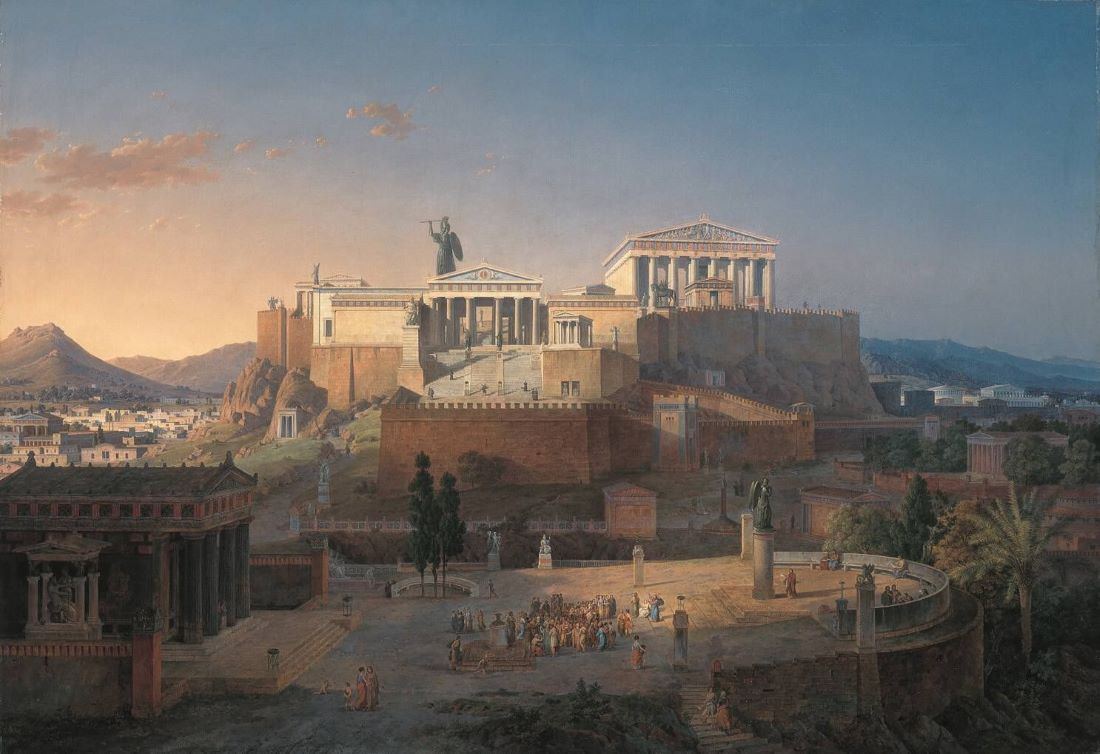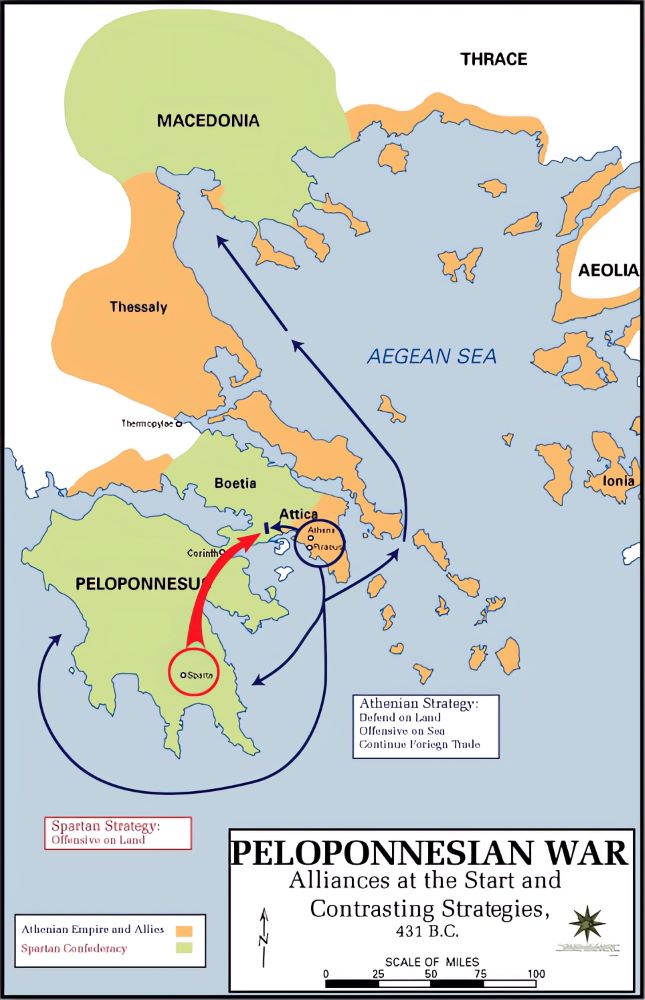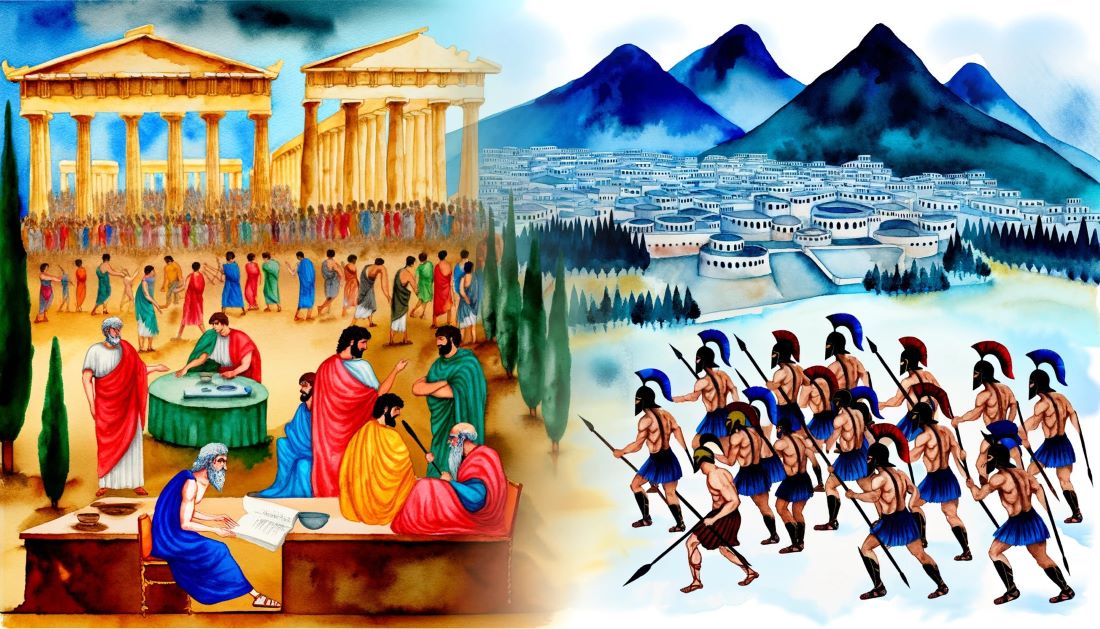The rivalry between Athens vs Sparta stands as one of the most famous and studied conflicts in ancient history. These two Greek city-states, emblematic of contrasting societies and ideologies, were formidable adversaries during the classical period of Ancient Greece. In academic circles, especially within classical studies programs, the question of “Athens vs. Sparta” frequently serves as a focal point for debate and analysis. Students are often tasked with defending the merits and criticisms of each city-state’s political, social, and military systems. This exploration not only sheds light on the historical intricacies of these ancient powers but also offers timeless insights into the nature of societal organization and governance.
Athens vs. Sparta: Contrasting Civilizations
The political systems of Athens and Sparta were as divergent as their ideologies. Athens, renowned for its early democratic system, placed power in the hands of its citizens, with decisions made through the Assembly where every male citizen had a voice. This democratic approach fostered a culture of debate, philosophy, and the arts, making Athens the cradle of Western civilization. Conversely, Sparta was ruled by a rigid oligarchy, centered around a dual monarchy and a council of elders known as the Gerousia. This system prioritized military discipline and austerity, shaping a society that was singularly focused on warfare and physical prowess.

The societal norms and attitudes towards women in both city-states also reflected their distinct ideologies. Athenian women were largely confined to domestic roles and had minimal political rights, whereas Spartan women enjoyed considerably more freedom and autonomy. They were encouraged to engage in physical training, manage estates in the absence of their warrior husbands, and had a say in the public sphere, albeit limited. This contrast in gender roles underscored the broader disparities between Athenian and Spartan life, including their approaches to alliances and governance. Athens led the Delian League, promoting democracy and expanding its influence through naval power, while Sparta headed the Peloponnesian League, cementing its status as a land-based military force. These alliances not only facilitated their dominance over the Greek world but also set the stage for the inevitable conflicts that would arise from their competing ambitions.
Athens vs. Sparta: The Main Conflict
The Peloponnesian War, a protracted and complex conflict that lasted from 431 to 404 BCE, marked the zenith of the rivalry between Athens and Sparta. The war’s roots lay in the growing resentment of Sparta and its allies towards Athenian dominance and the expansionist policies of the Athenian Empire. The Athenians, under their democratic government, had established a powerful naval empire through the Delian League, ostensibly to deter Persian aggression. However, their increasing control over league members, extracting tributes, and enforcing strict compliance, resembled more an empire than a mutual alliance. This aggressive expansion and the coercion of states into the Athenian Empire alarmed Sparta and its Peloponnesian League, setting the stage for conflict.

As the war unfolded, it showcased the stark contrast in military strategies and strengths of the two city-states. Athens relied on its superior navy to raid the coasts and supply their city, effectively using their wealth to hire mercenaries and maintain their fleet. Sparta, on the other hand, capitalized on its land-based military prowess, eventually receiving crucial financial support from Persia that allowed them to build a fleet capable of challenging Athenian naval supremacy. The turning point came with the catastrophic Athenian defeat in the Sicilian Expedition (415-413 BCE), which significantly weakened Athens. Ultimately, Sparta besieged Athens and, with Persian financial backing, broke Athenian naval power, forcing Athens to surrender in 404 BCE. The Spartan victory ended the Athenian Empire but did not establish Sparta as the dominant power for long. The war left much of Greece weakened, heralding a period of decline and paving the way for the rise of Macedonian and later Roman dominance. The end of the conflict highlighted the fragility of alliances and the limits of military power in ensuring lasting hegemony.
Notable Figures of Athens and Sparta
- Pericles (Athens): A prominent and influential statesman, Pericles led Athens during its Golden Age, promoting democracy, the arts, and the ambitious construction project of the Parthenon.
- Leonidas (Sparta): King Leonidas I is famed for his leadership of the Spartan forces during the Battle of Thermopylae, where he and his 300 elite soldiers made a legendary stand against the Persian army.
- Socrates (Athens): A foundational figure in Western philosophy, Socrates introduced a method of inquiry and debate focused on ethical concepts and the examination of human life.
- Alcibiades (Athens/Sparta): A charismatic and controversial leader, Alcibiades changed allegiance multiple times during the Peloponnesian War, serving both Athens and Sparta at different points in his career.
- Themistocles (Athens): A visionary politician and general, Themistocles was the architect behind Athens’ naval supremacy, crucial in the victory against Persia at the Battle of Salamis.
- Lysander (Sparta): A Spartan admiral, Lysander was instrumental in securing Spartan victory over Athens, ending the Peloponnesian War by blockading and starving the city into surrender.
- Phidias (Athens): Celebrated as one of the greatest sculptors of the Classical era, Phidias oversaw the construction and decoration of the Parthenon, including its massive statue of Athena.
- Gorgo (Sparta): Queen Gorgo of Sparta, known for her wisdom and political insight, played a crucial role in the Greek resistance against Persia by advising her husband, Leonidas, and other Spartan leaders.
Historical Challenge: Can You Conquer the Past?
Answer more than 18 questions correctly, and you will win a copy of History Chronicles Magazine Vol 1! Take our interactive history quiz now and put your knowledge to the test!

